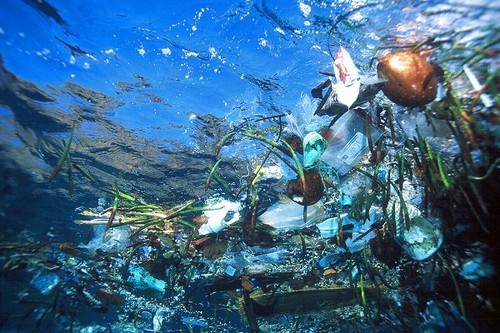Ending the Oceans Tragedy of the Commons
by ARC Centre of Excellence for Coral Reef Studies on 17 Sep 2010

Plastic ocean rubbish - Pacific Ocean Gyre SW
Leading international marine scientists are proposing radical changes in the governance of the world’s oceans to rescue them from over-fishing, pollution and other human impacts.
Based on a successful experiment in Chile, the researchers say a new approach to marine tenure could help to reverse the maritime ‘tragedy of the commons’ which has led to the depletion of fish stocks worldwide.
'Marine ecosystems are in decline around the world. New transformational changes in governance are urgently required to cope with over-fishing, pollution, global changes, and other drivers of degradation,' says Professor Terry Hughes of the ARC Centre of Excellence for Coral Reef Studies and James Cook University, one of the authors of a new scientific paper advocating sweeping reform of ocean governance.
'In recent years there has been a growing appreciation that the health of ecosystems like the oceans and human wellbeing are closely linked,' says co-author Dr. Per Olsson of the Stockholm Resilience Centre. 'Unfortunately, typical governance arrangements don’t effectively link these two essential elements, when trying to manage fishing pressure for example. They are often too rigid and don’t cope well with surprises or changed conditions.'
A combination of fisheries collapses and the move to democracy in Chile, quite by chance, provided the opportunity to try out some new arrangements for looking after fisheries, involving a partnership of fishers, scientists and managers.
'There was a general recognition that Chile’s fish stocks were in trouble,' says Professor Carl Folke, also from the Stockholm Resilience Centre and the Beijer Institute. 'Things were turbulent and people were looking for answers and that made them open to new approaches. There was also good scientific understanding of the coastal ecosystems of the region on which to base a new management plan.'
Fishers and scientists had been working together on the problem for some years, sharing knowledge and building trust. This led to the trialling of new co-operative models for fishery management, based on the latest that science can reveal about the state of the fish stock and the surrounding marine ecosystem.
The result is a revolutionary national system of marine tenure that allocates user rights and responsibilities to collectives of fishers.
'Although fine tuning is always needed to continue to build resilience of this new regime, this transformation has improved the sustainability of the interconnected social–ecological system,' Prof Folke adds.
A vital ingredient in the change was the move by Chile to democracy after a 17-year dictatorship. This opened the way for reform of the laws governing fishing rights.
The new laws gave exclusive ocean territories to local ‘artisanal’ fishers, and excluded the big industrial fishing fleets, which had their own exclusive fishing zone.
Scientists and small fishers then worked together to understand and rebuild the shattered fish stocks in their zone, leading to a shared vision and voluntary agreements on how to manage them. Fishing pressure was reduced in the industrial fishing zone by cutting the number of big vessels.
Professor Hughes says the Chilean experience contains lessons which can potentially apply anywhere in the world where a fishery is in trouble and there is good scientific data on the marine environment.
'You need a shared recognition that something has to be done, you need a good understanding of the marine ecosystem and how to regenerate it, you need a strong rapport between scientists and fishers, and you need a political moment when sweeping changes can be brought in,' he says.
'If you have all those things, there is a good chance you can avoid the marine ‘tragedy of the commons’ which has been a feature of fisheries around the world in the past half century.'
The research indicates the key to managing fisheries may depend on creating agreements that are both voluntary and flexible enough to cope with changes in the ocean environment, leading to fisheries that are both ecologically and socially sustainable.
'Navigating transformations in governance of Chilean marine coastal resources' by Stefan Gelcich, Terry P. Hughes, Per Olsson, Carl Folke, Omar Defeo, Miriam Fernándeza, Simon Foale, Lance H. Gunderson, Carlos Rodríguez-Sickert, Marten Scheffer, Robert S. Steneck and Juan C. Castilla appears in the latest issue of the Proceedings of the US National Academy of Sciences (PNAS).
http://www.coralcoe.org.au
If you want to link to this article then please use this URL: www.sailworldcruising.com/74756